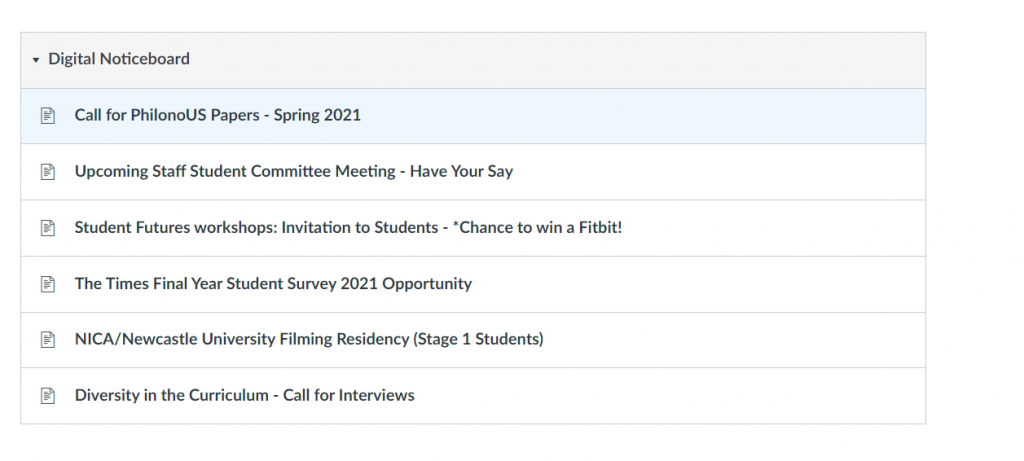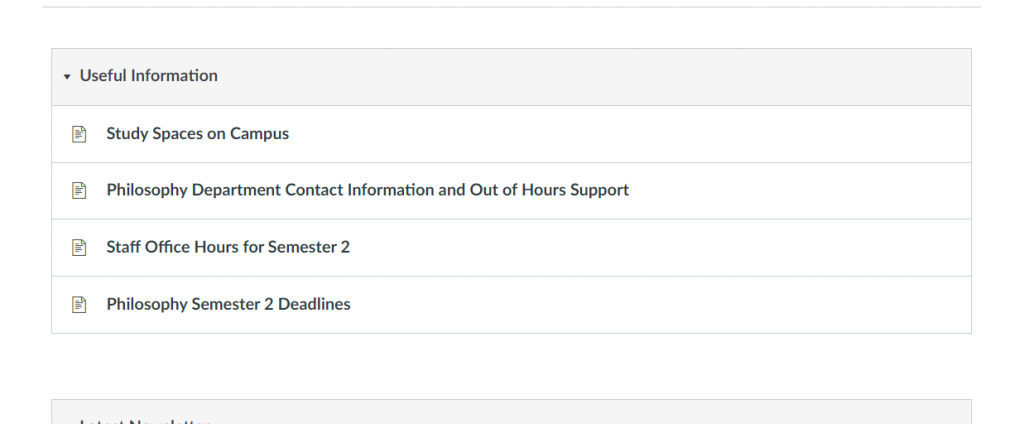Dan Graham, Learning and Teaching Assistant
Philosophy
Faculty of Humanities and Social Sciences
What did you do?
We created a Canvas Community to communicate with students and share useful resources including:
- A digital noticeboard
- Events
- Student/ Staff Committee information
- Philosophy Society updates
- Student led week newsletter
- Philosophy podcast hosted by Dr Stephen Overy

Who is involved?
- All Philosophy students at all stages and Combined Honours students who study Philosophy modules
- Dan Graham, Learning and Teaching Assistant
- Dr Stephen Overy, Lecturer and Student engagement coordinator
- Dr Adam Potts, Lecturer and Degree Programme Director
How did you do it?
The first step involved developing a sitemap outlining the different sections that would be useful for students. Once we had that in place, it was quite straightforward to develop the community in Canvas.
The community continues to evolve as students and colleagues see it as a great opportunity to engage with other students and share resources. For example, the Philosophy Society requested an area to share information about who they are, what they do and upcoming events that all students can get involved in.
As well as making sure that the content on the site is what students need, there were a few other areas we wanted to get right to make the community valuable to all students:
Structure
Canvas has enabled us to structure the community in a way that is easy to use so students can see all of the different sections on one page and easily navigate to the area they need. We’ve created templates for different types of content and this consistency helps students know where to go to find information.
The structure of the community is dynamic, and we try to think about the information that will be most important to students at a particular time and put that at the top. During assessment period important content included deadlines, staff office hours, where to go for out of hours support and study spaces available on Campus. So, we made sure this was the first thing that students saw when they visited the community.
Accessibility
Accessibility is a really important issue and we consider this with all content. We do have a PDF version of the newsletter but this is also converted into a Canvas page making it accessible for everyone.
Getting the communication right
I send out a weekly summary of anything new that’s been added to the community. This means that students aren’t bombarded with emails but get timely reminders about content they might be interested in.
Why did you do it?
We needed a space for students where we could share important information, events and opportunities in a way that wouldn’t be overwhelming. We knew we wanted to avoid sending lots of emails, so a Canvas community seemed a great option. There were also elements of the student common room that we wanted to recreate virtually. The digital noticeboard is a good example of this.
Setting up a community also means that we can easily enrol other students taking Philosophy modules, so for example Combined Honours students are part of the community.
Does it work?
Canvas analytics is a really helpful tool, and we can see that students are using the community. We can access data on page views and the average time students are spending on a page. This is all useful information when considering how well content is being received.
There are some aspects of the community that aren’t as well used as others, but we expect to see more engagement as the community develops over the next year. We’d love to see the community grow even more so students can use it as a place to chat and have a forum on there. We’re also thinking about how to improve the type of content we have and are exploring ideas around videos and podcasts to increase engagement with the Student Staff Committee.
Colleagues have also shared positive feedback about the community:
“The Philosophy Community is an invaluable resource for students. It presents important information in a simple and intuitive way. The Community has helped solve the problem of email saturation by making key dates and instructions easily visible, and keeping students informed about events and opportunities. The nature of the Community means this happens as a two-way process, and allows active students the chance to advertise events and opportunities they have found or created. Engagement with the Community has been very promising and we’ll keep growing it!”
Stephen Overy, Philosophy Lecturer and Student Engagement Co-ordinator
“The Philosophy Community page is a fantastic initiative conceived by our Learning and Teaching Assistant, Daniel Graham. This page, located on all Philosophy student’s Canvas dashboards, houses key information related to the programme, including the Philosophy newsletter, assessment deadlines, society events, committee dates, socials, and much more. It is a smart way of organising a range of information that is user-friendly and accessible. Also, given the email saturation that occurred this academic year, it helps streamline the Philosophy communications. The page launched this year and saw great engagement. It will be a vital tool for the degree going forward.”
Student Voice
“This Community is designed to contain all of the workings of the department in one, easy-access location, so we no longer have to sift through past emails to find updates/announcements, old issues of the newsletter etc”.
“The podcast is a great way to find out more about our very interesting faculty and the research that they are currently working on.”
Izzy Mitcham 3rd Year Philosophy Student

